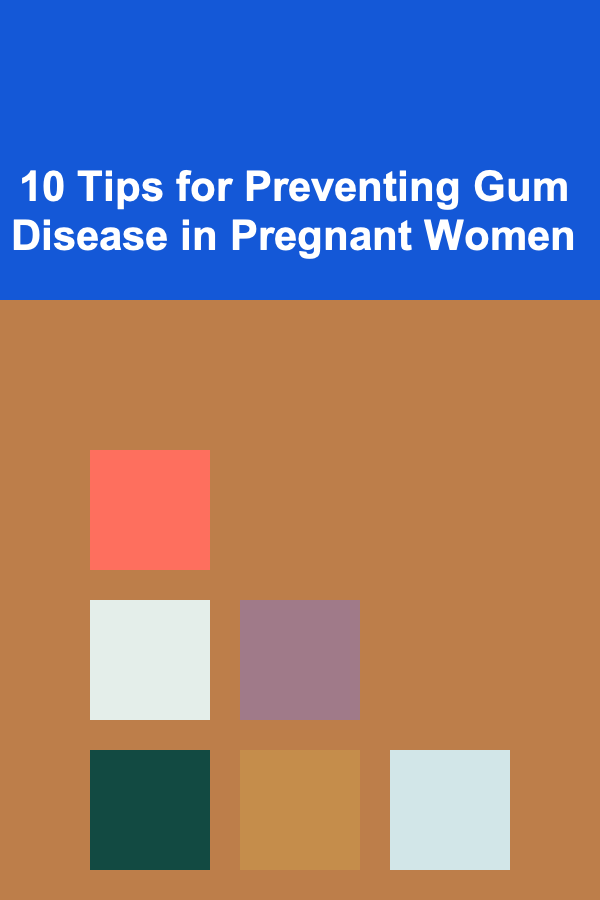
10 Tips for Preventing Gum Disease in Pregnant Women
ebook include PDF & Audio bundle (Micro Guide)
$12.99$9.99
Limited Time Offer! Order within the next:

Pregnancy is a time of significant physical, emotional, and hormonal changes. One area that many women may not be aware of during this period is the health of their gums and teeth. Pregnancy can affect oral health, increasing the risk of gum disease (also known as gingivitis) due to hormonal changes and the physical stresses of pregnancy. If left untreated, gum disease can lead to more serious conditions, including tooth loss or complications with pregnancy. Fortunately, with proper care, gum disease is largely preventable.
In this article, we will explore 10 essential tips for preventing gum disease during pregnancy. By understanding the risks and taking proactive measures, you can protect your oral health, contribute to your overall well-being, and reduce the risk of pregnancy complications related to oral hygiene.
Brush Your Teeth Twice a Day with Fluoride Toothpaste
One of the most fundamental ways to prevent gum disease is by brushing your teeth regularly. The American Dental Association (ADA) recommends brushing your teeth at least twice a day with fluoride toothpaste, especially during pregnancy when your body is more susceptible to oral health issues. Brushing your teeth helps remove food particles and plaque buildup, which is the primary cause of gingivitis.
- Use a soft-bristled toothbrush: Pregnancy can lead to sensitive gums and teeth, so using a soft-bristled toothbrush is ideal for cleaning without causing irritation or damage.
- Brush gently: Avoid harsh brushing, which can harm your gums, leading to receding gums or tooth sensitivity.
Brushing your teeth regularly ensures that plaque does not have the chance to build up, significantly lowering the risk of developing gum disease.
Floss Daily to Remove Plaque Between Teeth
Brushing alone does not reach all surfaces of your teeth, particularly the areas between your teeth where plaque can accumulate. Flossing is essential to ensure that you thoroughly clean all the nooks and crannies that your toothbrush can't access. Daily flossing helps remove food particles, plaque, and bacteria from between your teeth and below the gumline, preventing gum disease.
- Be gentle while flossing: Pregnant women often experience more sensitive gums, so use gentle motions when flossing to avoid causing damage to your gum tissue.
- Consider dental floss alternatives: If you find traditional floss difficult to use, consider using dental floss picks, interdental brushes, or a water flosser as alternatives.
Flossing daily is a crucial step in preventing gum disease, especially during pregnancy when your gums are more vulnerable to inflammation and infection.
Visit Your Dentist Regularly
Routine dental visits are an important part of maintaining good oral health during pregnancy. Dentists can detect early signs of gum disease and other oral health problems before they become severe. It is recommended that pregnant women visit the dentist at least once during their pregnancy for a comprehensive checkup and cleaning.
- Inform your dentist about your pregnancy: Be sure to tell your dentist if you're pregnant, as they may need to adjust certain treatments or procedures to ensure your safety and comfort.
- Regular cleanings: Professional cleanings help remove hardened plaque (tartar) that brushing and flossing alone cannot eliminate, further reducing your risk of gum disease.
Dental checkups provide an opportunity for early intervention, ensuring that any potential problems are addressed before they escalate.
Eat a Balanced Diet Rich in Vitamins and Minerals
Good nutrition plays a vital role in maintaining healthy gums and teeth during pregnancy. A well-balanced diet that includes a variety of essential nutrients supports your immune system and helps reduce inflammation in your gums, making it easier to fight off infections, including gum disease.
Key nutrients for oral health include:
- Vitamin C: Found in citrus fruits, strawberries, and green leafy vegetables, vitamin C is important for gum health as it helps strengthen gum tissue and supports the healing of any injuries to the gums.
- Calcium: Found in dairy products, leafy greens, and fortified foods, calcium helps build strong teeth and bones, reducing the risk of tooth decay and gum disease.
- Vitamin D: Vitamin D helps your body absorb calcium and plays a role in immune function, reducing inflammation in the gums.
In addition to these key nutrients, stay hydrated by drinking plenty of water throughout the day to keep your mouth moist and flush away food particles and bacteria.
Control Pregnancy-Related Hormonal Changes
During pregnancy, elevated hormone levels, particularly progesterone, can cause the gums to become more sensitive, inflamed, and prone to bleeding. This condition, known as pregnancy gingivitis, can lead to gum disease if not properly managed. While hormonal changes are beyond your control, there are strategies to mitigate their impact on your oral health:
- Maintain a strict oral hygiene routine: Because your gums are more sensitive during pregnancy, it's essential to brush and floss thoroughly to keep plaque buildup in check.
- Rinse with saltwater: If you experience swollen or irritated gums, rinsing with warm saltwater can help reduce inflammation and soothe your gums.
- Avoid tobacco and alcohol: Smoking and excessive alcohol use can exacerbate gum disease and inflammation. Pregnant women should avoid these habits entirely to reduce the risk of complications.
By staying on top of your oral hygiene and following these simple strategies, you can help manage pregnancy-related hormonal changes that may affect your gum health.
Use a Mouthwash with Antibacterial Properties
In addition to brushing and flossing, an antimicrobial mouthwash can be an effective way to reduce plaque buildup and prevent gum disease. Mouthwash helps kill bacteria in the mouth and can also help reduce inflammation and promote gum health.
- Choose alcohol-free mouthwash: Some mouthwashes contain alcohol, which can cause a dry mouth and irritation, especially during pregnancy. Look for alcohol-free versions that are gentle on your gums and teeth.
- Consult your dentist: Your dentist can recommend a mouthwash that is safe for use during pregnancy and specifically targeted to prevent gum disease.
Using mouthwash as part of your daily oral care routine provides an added layer of protection against gum disease and keeps your breath fresh.
Manage Pregnancy-Related Nausea and Vomiting
Many pregnant women experience nausea and vomiting, especially during the first trimester. While this is a normal part of pregnancy, it can have an impact on your oral health. Vomiting exposes your teeth to stomach acid, which can erode tooth enamel and lead to dental decay. It's important to take measures to protect your teeth during this time:
- Rinse with water after vomiting: After vomiting, rinse your mouth with water or a fluoride mouthwash to neutralize stomach acid and protect your teeth from enamel erosion.
- Wait before brushing: It's tempting to brush your teeth immediately after vomiting, but it's best to wait at least 30 minutes. Brushing too soon can spread the acid over your teeth, causing more damage.
Taking these steps can help mitigate the harmful effects of acid on your teeth and gums.
Avoid Sugary Snacks and Drinks
Pregnancy cravings can often lead to the desire for sugary foods and drinks, which can contribute to plaque buildup and the development of gum disease. Sugary foods and drinks feed the bacteria in your mouth, promoting the production of acids that can damage your teeth and gums.
To reduce your risk of gum disease:
- Opt for healthier snacks: Choose snacks like fresh fruits, vegetables, and nuts that are beneficial for both your overall health and your oral health.
- Limit sugary beverages: Try to avoid sugary drinks like soda, juice, or sweetened coffee. If you do indulge, be sure to rinse your mouth with water afterward.
By choosing healthier options, you can reduce the likelihood of plaque buildup and gum disease during pregnancy.
Manage Stress Levels
Stress is a common issue during pregnancy, and it can have a negative impact on your oral health. High stress levels can lead to a weakened immune system, making it harder for your body to fight off infections, including those in your gums.
To manage stress during pregnancy:
- Practice relaxation techniques: Engage in activities like yoga, meditation, or deep-breathing exercises to reduce stress and improve your overall well-being.
- Get enough rest: Adequate sleep is essential for stress management and overall health, so aim to get at least 7-8 hours of sleep each night.
- Stay active: Regular exercise, like walking or swimming, can help reduce stress and promote better physical and mental health.
Managing stress not only benefits your mental health but also plays a significant role in protecting your gums and teeth from disease.
Seek Professional Help for Gum Problems
If you notice any signs of gum disease, such as red, swollen, or bleeding gums, it's important to seek professional help promptly. Early intervention can prevent the condition from worsening and avoid complications. Your dentist can recommend treatments such as:
- Deep cleaning: If you have advanced plaque buildup or gingivitis, your dentist may perform a deep cleaning (scaling and root planing) to remove tartar and bacteria from below the gumline.
- Prescription treatments: In some cases, your dentist may prescribe antibiotics or antimicrobial treatments to help manage infection.
By addressing gum problems early, you can prevent them from progressing into more serious issues that could affect your pregnancy or long-term oral health.
Pregnancy brings many joys, but it also requires extra care and attention to your health. By following these 10 tips for preventing gum disease, you can ensure that your gums and teeth stay healthy throughout your pregnancy. Remember, good oral hygiene is not only important for your own health but for the well-being of your baby as well.
Reading More From Our Other Websites
- [Personal Care Tips 101] How to Use Lip Balm to Protect Your Lips from Sunburn
- [Personal Finance Management 101] How to Avoid Lifestyle Inflation and Keep Saving
- [Beachcombing Tip 101] Reading the Sand: How to Identify and Collect Interesting Finds as a New Beachcomber
- [Home Renovating 101] How to Finance Home Renovation: Securing Low-Interest Loans and Grants
- [Personal Finance Management 101] How to Utilize Tax Deductions for Homeowners to Save More Money
- [Small Business 101] Top Small Business Resources for Entrepreneurs in 2025
- [Home Maintenance 101] How to Clean a Bathroom: Quick and Effective Cleaning Hacks
- [Home Lighting 101] How to Use Lighting to Make Your Small Space Feel Bigger
- [Screen Printing Tip 101] Color Vibrancy Showdown: Screen Printing vs Heat Transfer Explained
- [Personal Care Tips 101] How to Choose the Best Sunscreen for Sensitive and Allergy-Prone Skin

How to Build and Sell Predictive Models for Passive Income
Read More
How to Set Financial Goals and Achieve Them
Read More
How to Use Plants to Brighten Up Your Home on a Budget
Read More
Mastering the Art of Customer Service: A Comprehensive Guide for Call Center Representatives
Read More
How to Brew Pale Ales and Amber Ales
Read More
10 Tips for Repurposing Glass Jars
Read MoreOther Products

How to Build and Sell Predictive Models for Passive Income
Read More
How to Set Financial Goals and Achieve Them
Read More
How to Use Plants to Brighten Up Your Home on a Budget
Read More
Mastering the Art of Customer Service: A Comprehensive Guide for Call Center Representatives
Read More
How to Brew Pale Ales and Amber Ales
Read More